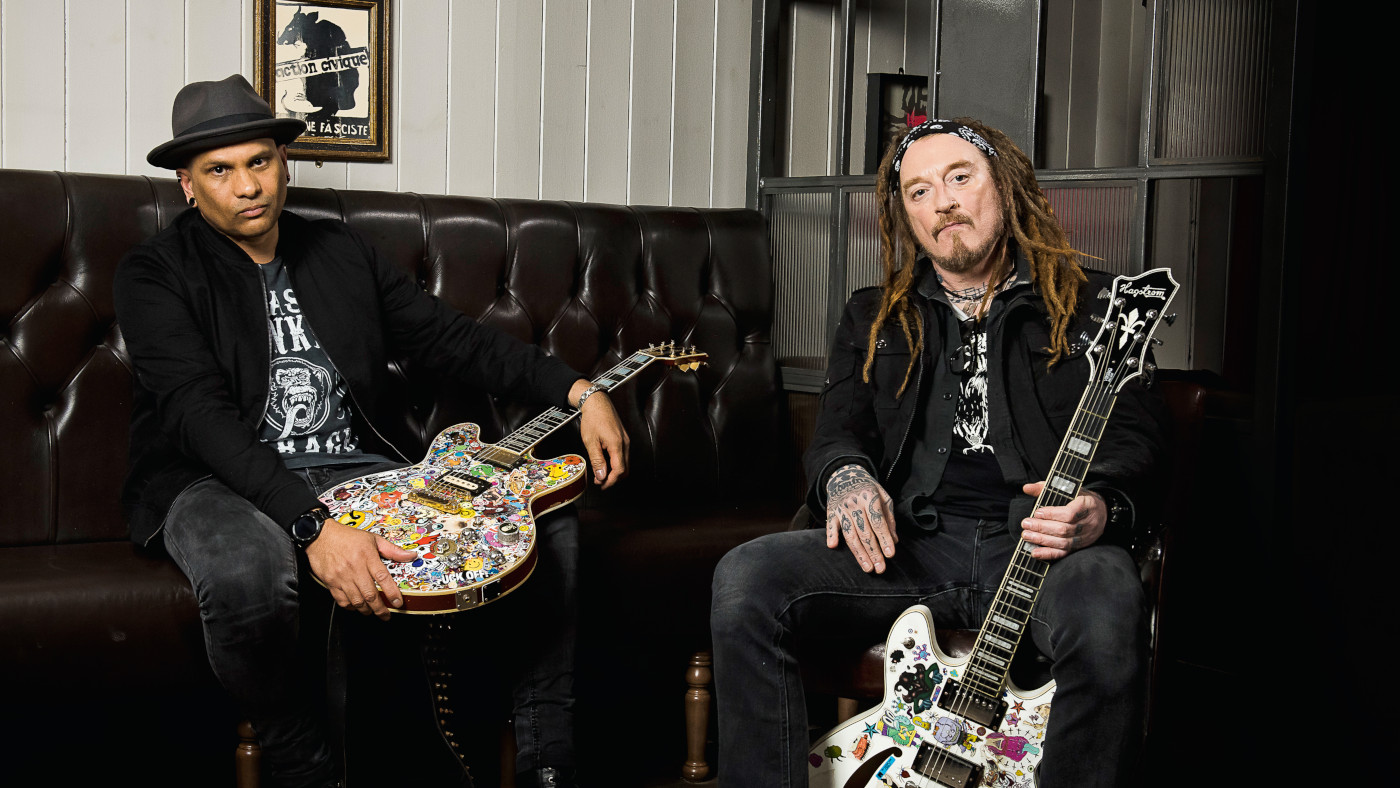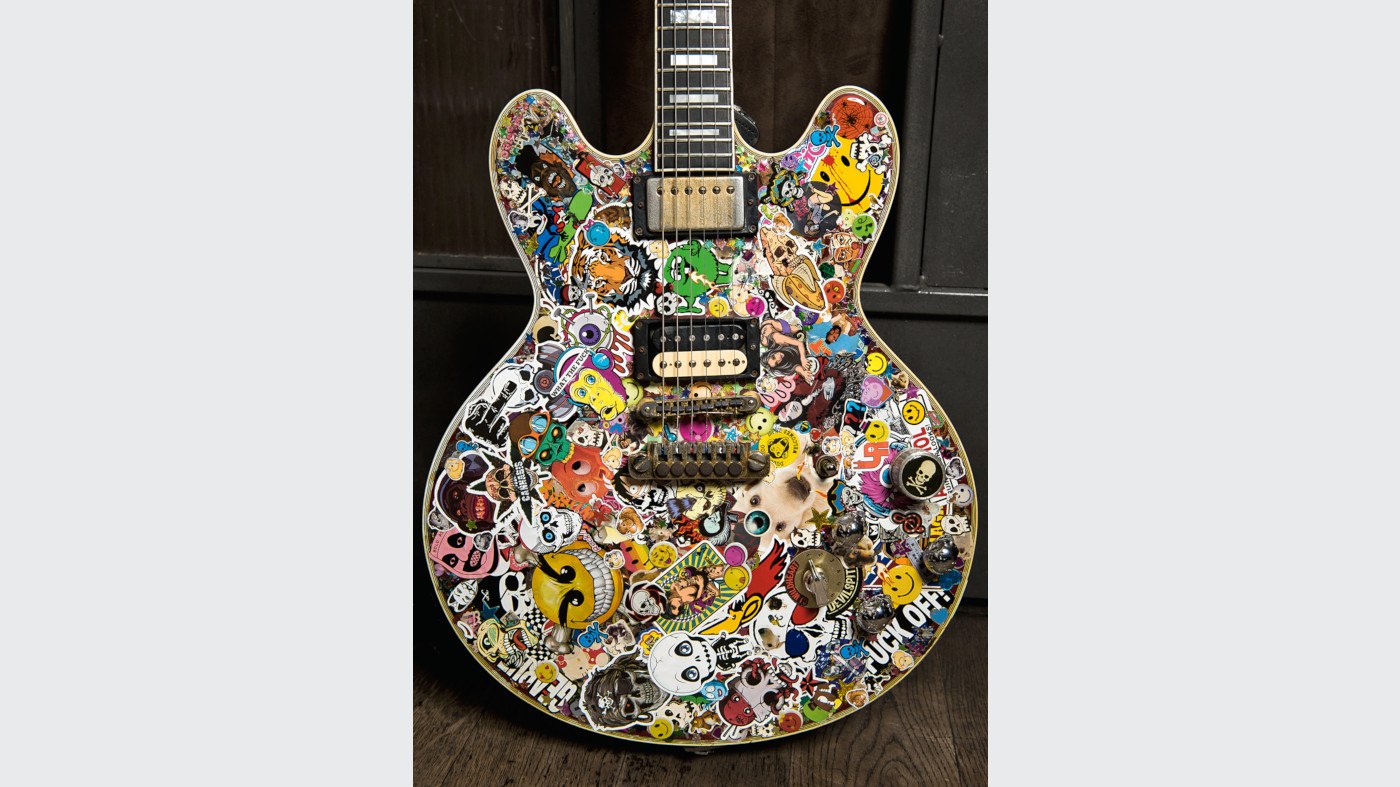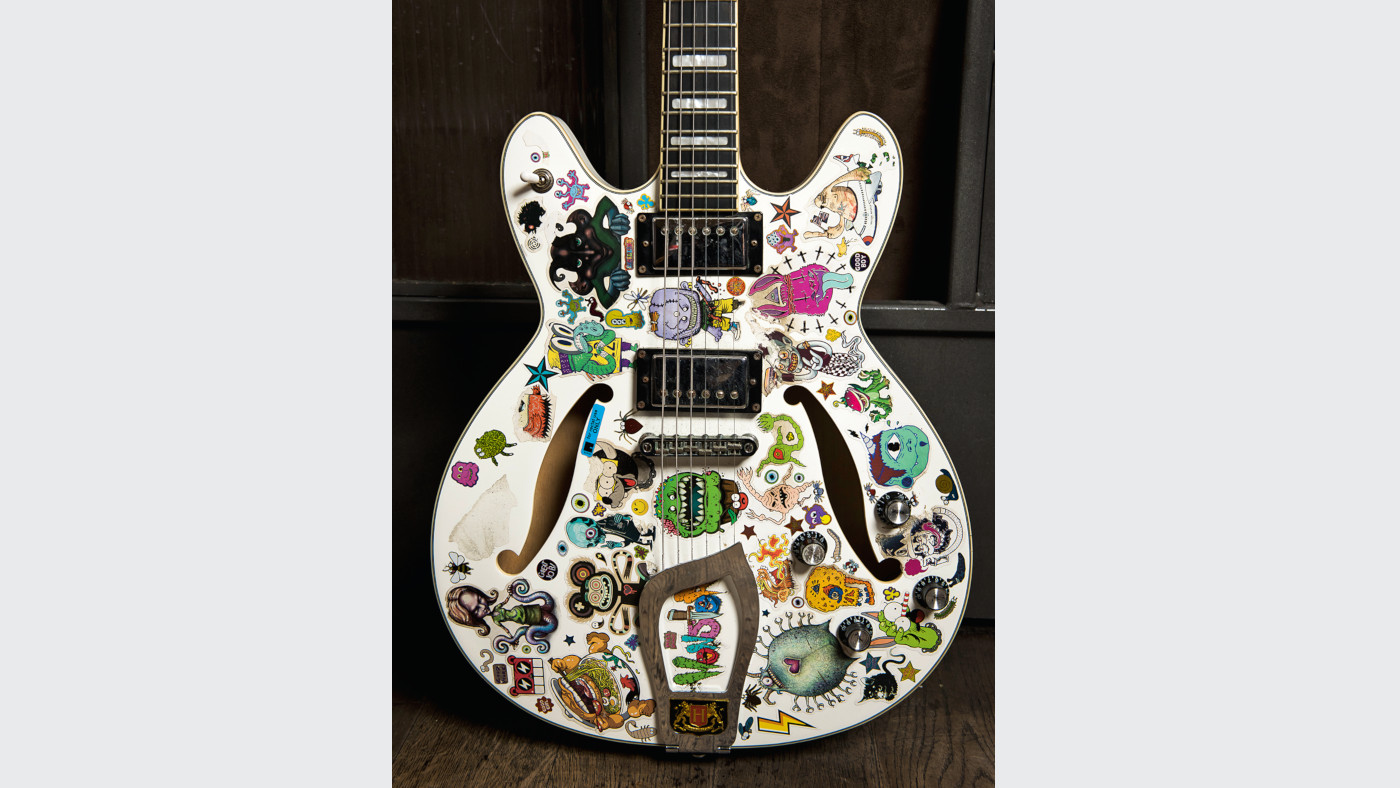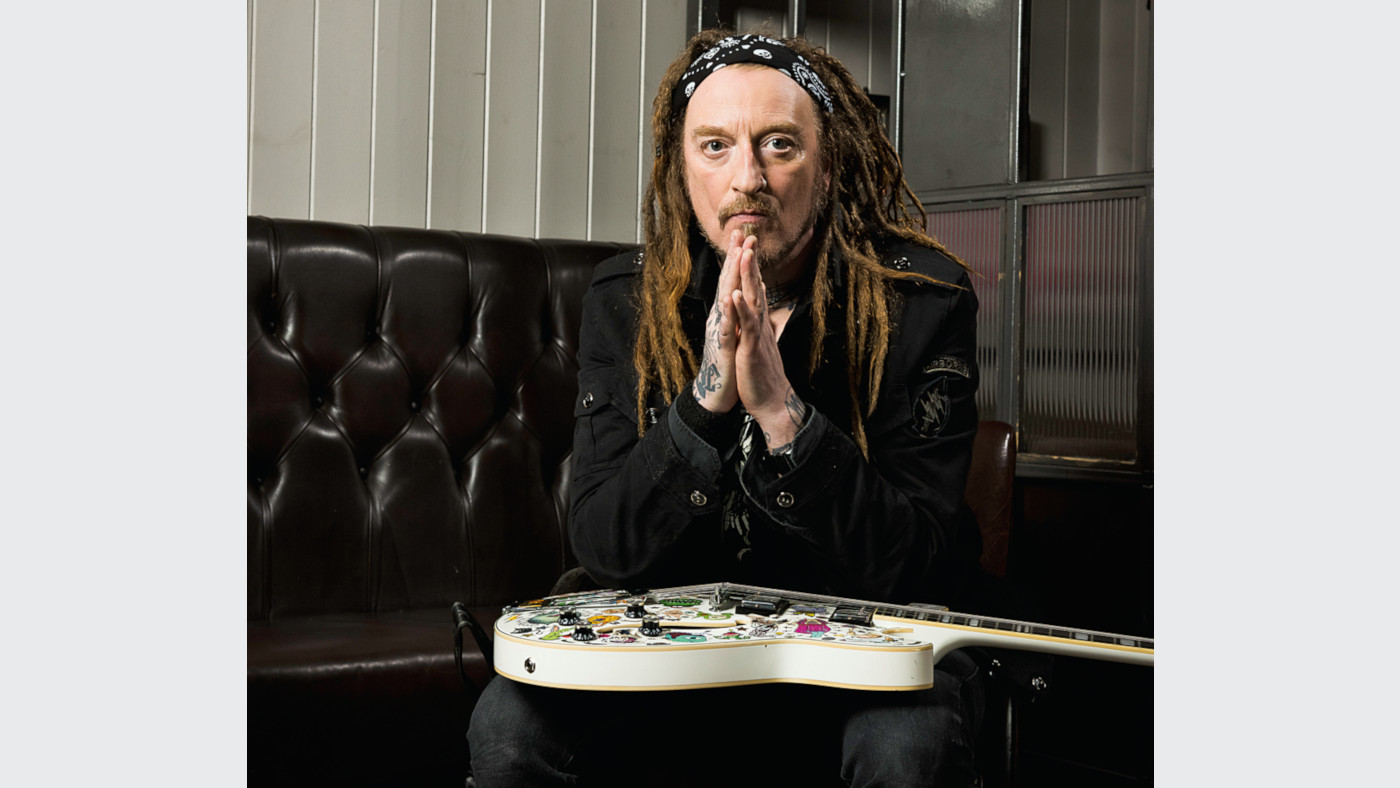The Wildhearts: “My guitar has saved my life so many times”
On their 30th anniversary as a band, Ginger and CJ from The Wildhearts look back

Want all the hottest music and gear news, reviews, deals, features and more, direct to your inbox? Sign up here.
You are now subscribed
Your newsletter sign-up was successful
There is simply no other band quite like The Wildhearts. Since forming in Newcastle some 30 years ago, the quartet have become natural successors to the original British punk icons who inspired them - bringing acerbic and vitriolic sounds into the mainstream once again.
But there was always so much more to that wall of noise than the obvious - they appropriated the earworm melodies of The Beatles and The Beach Boys to temper those often-metallic edges of sonic disarray. It would be this groundbreaking reimagination of heaviness that would help evolve punk rock into avenues new, feeling as exciting and dangerous as it did intelligent and considered, their ideas stemming from the head as much as the heart.
They lent me this Lucille in 1990; eventually I got enough money from our label to buy it. There’s probably about five layers of stickers now
Now, a decade on from their last full-length, The Wildhearts have returned with ninth studio album Renaissance Men - an incredibly fitting name for a group who have taken a kitchen sink approach to music that, by their own admission, absorbs influence from as far and wide as Burt Bacharach and Abba. Founding singer/axeman Ginger and co-guitarist CJ explain how boxing yourself into a limited genre or style will only restrict the creative flow...

So which guitars did you use for the new recordings?
CJ: “I still play my highly customised B.B. King signature. I remember we went to the Gibson Custom shop in Nashville because my Lucille needed some work done to it. I remember overhearing them saying, ‘Oh god, what has this guy done to this guitar?!’. I wanted to individualise it so I didn’t get mistaken for B.B. King! I didn’t even own a guitar when this band got started.
“Ginger had this black Ibanez I used and soon we started borrowing Gibsons for our gigs. They lent me this Lucille in 1990; eventually I got enough money from our label to buy it. There’s probably about five layers of stickers now. They don’t get cleaned or taken off, we just keep adding more. The original pickups were more bluesy and low output, so someone at Gibson had this other thing he thought I’d like. It has no make or marking... no one can figure out what it is!”
Ginger: “That was back when I got my black Les Paul Custom. I ended up auctioning it for the Japanese Tsunami Appeal because I had no money and I wanted to help. It actually got a fair bit of money, about £25k! Not long ago, I ended up trying out some Hagstroms because I remembered seeing the red Viking from the Elvis ’68 Comeback Special. They make the best guitars, perfect for the studio and live. The necks are great - yes, believe it or not, we use the entire neck in this band - and they always stay in tune. The pickups are really porky too.”
Want all the hottest music and gear news, reviews, deals, features and more, direct to your inbox? Sign up here.

Keep it simple
As for amps, we understand you’ve generally favoured Marshalls in the past...
Ginger: “We’re still Marshall aficionados. I liked Mesa-Boogie for a while too, but we ended up coming back to Marshall because they sound the best and they look after their artists so well.
“I had a lucky JCM800 when we started out and I actually thought all amps were the same as that, so I stupidly got rid of it and ended up going through another 10 and still couldn’t find one quite the same. Then a few years ago, I managed to find an 800 that sounded very close to my original so now that’s all I use. It’s an adaptable amp for any scenario.”
We got to tour with AC/DC. Angus’ guitar tech was a Geordie, which was handy, so we found out exactly what they do...
CJ: “My favourite was my 100-watt 1974 JMP. It went missing; I never knew what happened to it. I had an 800 for a while too, then left Marshall for some years, but now I just stick with the 100-watt DSL head, which is brilliant. You can get somewhere in between the vintage sounds and tones with more gain, without needing an EQ pedal or some extra dirt. The JVMs are more modern while the DSLs are a good halfway point.”
Diagnosis from the new album has a real AC/DC feel to it - sitting somewhere in between Riff Raff and Thunderstruck...
Ginger: “When we started, our MO for the live shows was to play AC/DC riffs, basically! On the records, there were more influences from Stiff Little Fingers, The Damned, plus American punk like The Ramones, Descendents and Bad Brains. Riff Raff has always been our favourite AC/DC song.
“There are very few bands that you can identify with as instantly as AC/DC or Motörhead or Status Quo. At band practice you say that band name and everyone knows what you mean. We got to tour with AC/DC and see it all up-close and first-hand. Angus’ guitar tech was a Geordie, which was handy, so we found out exactly what they do...”
CJ: “That roadie told us how many people would come up asking how he got that sound and the answer was always the same - an SG, a lead and a Marshall. But put that guitar in anyone else’s hands and it wouldn’t be the Angus sound. It’s how he hit the chords... you can try and mimic it, but that kind of guitar sound is unique to the player.”
Which probably explains why The Wildhearts have always been known for a similarly direct assault...
CJ: “Right now, I don’t use any pedals. I fucked them all off... except for a couple of parts where I used a vintage Tube Screamer-style overdrive. I’d never heard of it before but I think it was called the Wanker pedal, which looked about 60 years old, haha!
“This new album is as stripped as it gets; there’s no double tracking - it’s just one of us on the left and the other on the right, with very few overdubs or solos. It’s more about that live band grunt, coupled with Danny McCormack’s bass sound, which he describes as his big pair of bollocks, unwashed and extra vinegary.”

Steak and Angel Delight
You formed in 1989 - a year which, with hindsight, marked a turning point for rock music. Did it feel like that at the time?
CJ: “The 70s had turned into the 80s and then after thrash, just as the grunge thing was coming in, we just found ourselves loving it all, everything from KISS to the Pistols and Primus. Right at the beginning, everyone said we were Metallica meets the Beach Boys - which is an odd way to describe any band, a bit like saying we were a cross between steak and jelly...”
A lot of our subject matter is dark - if we didn’t have those catchy melodies, we wouldn’t get our point across
Ginger: “Steak and Angel Delight probably sounds nice to a lot of people! But looking back, we found it hard to decide what kind of music to play in our band. We loved Master Of Puppets as much as Never Mind The Bollocks, but we also loved Abba. We took the poppy things and the riffy things; I don’t think anyone had mixed the extreme sides of both in the same way as us.
“I always assumed it was because that couldn’t be done unless you were in The Cardiacs, who had mastered the use of obscure chords and clever timings like Rush - weird pairings going from an E to an E flat. Their leader, Tim Smith, was playing on his strengths - mixing Jesus Christ Superstar, Split Enz, Frank Zappa and Motörhead together.
“That was his menu, there was so much to choose from. Find your menu, don’t just try to be Eddie Van Halen, because there’s someone already out there who is better at that than you... his name’s Eddie Van Halen!”
Most punks would be loathe to admit they were so heavily influenced by pop...
Ginger: “We love pop music. A lot of our subject matter is dark - if we didn’t have those catchy melodies, we wouldn’t get our point across. It would turn people away for being too bleak. The uplifting melody gets the message across. The things we sing about will never be acceptable or universally palatable... we have to find ways to make people listen so it’s more than just noise.
“This might sound really wanky, but before 1977, music came from expert songwriters. When punk or even thrash came in, it was an open door for people with limited skills to get out there. I’m still a fan of writing proper music, I grew up listening to stuff like Burt Bacharach - ideas with interesting chords and inversions. It comes from being brought up pre-genres, really.”
CJ: “I think we all just need to get to that chorus as quickly as possible. People don’t want to wait for that strong melody. It doesn’t need to be sugar-coated the whole way through - we prefer to think of it as punching someone in the face and then covering them with kisses afterwards, ha ha!”
So how exactly do the parts get shared between you?
Ginger: “It’s all about using open chords and barre chords within the same song. We’re like The Ramones in the verse and Cheap Trick in the chorus, which sounds like a different style completely. Mixing in between things has always come very naturally to us, but there’s a lot of arranging that goes on. There’s a very bombastic side to The Wildhearts, but there are a lot of subtleties to freshen the song, for us as much as the audience. You can use things like that as a neat little effect.
“This album had to be raw, we all got given one channel and that’s it, we had to make the most of it. Clever isn’t the right word, but our ideas are surprisingly effective and economic. We do it all in one live passage rather than dropping in. When we harmonise, we swing it all round - I might start high and then end doing the lower, and vice versa for CJ, all within the same verse or chorus! It’s quite out there in that sense.”

Treading the line
There’s always been a fine balance between preparation and spontaneity, then?
CJ: “Pre-production saves time and money. The less time you’re in the studio, the more urgency you get to your sound. You can overprocess and overproduce things. We don’t want our records to sound like someone’s been mixing away for two years because that’s not our sound. Even now, I spent four days doing my guitars and vocals. Ginger does his guitars with Ritch [Battersby, drums] because they’re both first take kinda guys. That guide would also end up being the real take, unless a string got broken or something went out of tune.”
Ginger: “Even then, I try to keep all my mistakes and make something cool out of them. I might even repeat that mistake later in the song! Putting the whole thing under a microscope, you can easily get bored of your record before anyone’s had a chance to hear it.”
You can walk past a guitar and it’ll go to you, ‘Incoming!’. You can almost see the song in the strings...
You fell out with each other in 1994, which resulted in a young Devin Townsend being recruited. What do you remember about that era?
CJ: “You hurt him, didn’t you?”
Ginger: “Yeah... he didn’t have a good time. When we met him, he was all about being really brutal, heavy and fast, he hadn’t opened up his brain to the kind of world music he makes now. We were probably his first proper band - we met him while he was playing with Steve Vai on this European tour that we were also on. He wouldn’t travel with the rest of those guys - he came on our tour bus.”
This must have been around the time he famously defecated in Steve Vai’s guitar case?
CJ: “Yeah, I don’t think he was having the best time in that band either! We hated that tour too. I remember swinging my guitar around Steve’s tour manager’s face. He said, ‘You’re off the tour!’ and I remember hearing Steve say, ‘No, he’s not!’. I think we might have even left before it got to the UK.”
Ginger: “We nearly killed that bass player, Scott Thunes, who was from the Frank Zappa band. A bigger tosser you could not meet! One of us, it might have even been me, had him on the pool table, threatening to smash his head at one point. It was a mismatched tour but we met Devin through it and we’re still good friends to this day.”
You’ve spoken openly about your struggles with mental health. How much has music helped during the more turbulent times?
Ginger: “My guitar has saved my life so many times. As cursed as I feel suffering from manic depression, I feel blessed because I can get it out of my system and into a song. I’m not one of those people who suffers from inert depression, spending days and days in bed; mine’s more about not being able to find joy in anything.
“So that’s what I write about, and those songs speak to people experiencing similar things. I’ve found songs that I’ve written while depressed have been the ones people thank me for. That’s made me look at my guitar almost like a dog, like this living and breathing companion. You can walk past a guitar and it’ll go to you, ‘Incoming!’. You can almost see the song in the strings...”
CJ: “For me, the guitar is more like a painter’s brush or a writer’s pen. My guitar wasn’t an aid to my recovery though - that was more my family. I actually shunned it for a while; I couldn’t face playing and it made me feel worse for some reason. Eventually I found a way to channel my emotions through music again.”
The Wildhearts’ new album Renaissance Men is out now on Graphite Records.
Amit has been writing for titles like Total Guitar, MusicRadar and Guitar World for over a decade and counts Richie Kotzen, Guthrie Govan and Jeff Beck among his primary influences. He's interviewed everyone from Ozzy Osbourne and Lemmy to Slash and Jimmy Page, and once even traded solos with a member of Slayer on a track released internationally. As a session guitarist, he's played alongside members of Judas Priest and Uriah Heep in London ensemble Metalworks, as well as handling lead guitars for legends like Glen Matlock (Sex Pistols, The Faces) and Stu Hamm (Steve Vai, Joe Satriani, G3).


